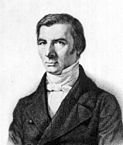That Which is Seen, and That Which is Not Seen: Introduction
Series Introduction
Frédéric Bastiat was a French philosopher and economist whose writings were among the leading free-market treatises of the 19th century. I intend to reproduce some of his works on the Steemit blockchain.
The source material for this post—and far more as well—is available at Bastiat.org. I intend to decline payout on future posts in this series since it will be a reproduction of someone else's work despite being long past copyright protection and now in the public domain. I will add a comment after those post for those who wish to offer an upvote to support them.
This first work, That Which is Seen, and That Which is Not Seen, was originally published in 1850 and contains some of the most clear and concise refutations of economic fallacies that remain popular to this day. Keynesian and Marxist ideas alike are demolished with simple explanations based on the analysis of unseen factors easily overlooked in superficial analysis.
Below, I include the introduction from the book. I cannot give credit to the translator, because the source page states uncertainty on this matter as well.
Introduction
In the department of economy, an act, a habit, an institution, a law, gives birth not only to an effect, but to a series of effects. Of these effects, the first only is immediate; it manifests itself simultaneously with its cause — it is seen. The others unfold in succession — they are not seen: it is well for us, if they are foreseen. Between a good and a bad economist this constitutes the whole difference — the one takes account of the visible effect; the other takes account both of the effects which are seen, and also of those which it is necessary to foresee. Now this difference is enormous, for it almost always happens that when the immediate consequence is favourable, the ultimate consequences are fatal, and the converse. Hence it follows that the bad economist pursues a small present good, which will be followed by a great evil to come, while the true economist pursues a great good to come, — at the risk of a small present evil.
In fact, it is the same in the science of health, arts, and in that of morals. It often happens, that the sweeter the first fruit of a habit is, the more bitter are the consequences. Take, for example, debauchery, idleness, prodigality. When, therefore, a man absorbed in the effect which is seen has not yet learned to discern those which are not seen, he gives way to fatal habits, not only by inclination, but by calculation.
This explains the fatally grievous condition of mankind. Ignorance surrounds its cradle: then its actions are determined by their first consequences, the only ones which, in its first stage, it can see. It is only in the long run that it learns to take account of the others. It has to learn this lesson from two very different masters — experience and foresight. Experience teaches effectually, but brutally. It makes us acquainted with all the effects of an action, by causing us to feel them; and we cannot fail to finish by knowing that fire burns, if we have burned ourselves. For this rough teacher, I should like, if possible, to substitute a more gentle one. I mean Foresight. For this purpose I shall examine the consequences of certain economical phenomena, by placing in opposition to each other those which are seen, and those which are not seen.

If you like this post, please comment, follow, and resteem!

If you like this post, please comment, follow, and resteem!

If you like this article then click here to read more about the subject.
(Keywords: introduction, work, consequences, effect, economist, seen, takes, account, series, effects, good)
Hey man Great post!
Nice post. I just Followed you. Please follow me.
https://steemit.com/steemit/@shayne/new-to-steemit-follow-begging-will-destroy-you-do-not-do-it-here-s-why
Begging for follows and votes in comments on someone else's post is not cool. People will probably flag you for it if you keep it up. If you want to earn real support, actually comment with something of substance related to the post.
@jacobtothe I hope you're posting this with the intent of opening discussions about it.
From a post about using randowhale & minnowbooster that I just this very second commented on:
Could Bastiat's statement imply that a little bit of upvote buying now, is acceptable as long as it doesn't become the norm?
I don't see a connection.
I'm not a big fan of buying exposure. (small present evil)
Maybe I'm just naive?
I'm not a fan of it either, but I fail to see how it is relevant to the subject of economic policies and principles as framed in Bastiat's work.
Perhaps we can examine it in more depth, though.
What is seen?
Some people get paid, and other people get extra upvotes to fuel bigger payouts
What is not seen?
Perhaps the votes that could have been made for other users' material, or the unaltered distribution of the reward pool
I think you're correct, my problem with paid upvotes is probably more of an ethical issue than economic one.
You could easily make the argument that the reward pool distribution is already being altered.
Yeah, bots have always been mucking that up for as long as I have been here. It does seem sketchy to buy votes.
But this is economics, not ethics. ;-)
And I'm already reading the next post.
Thanks for the excellent initiative of getting this onto the blockchain! ;)
😄😇😄

Help me please vote for my comment I need it, I would appreciate it very much
Begging for follows and votes in comments on someone else's post is not cool. People will probably flag you for it if you keep it up. If you want to earn real support, actually comment with something of substance related to the post.
I noticed in his comments that it's all this exact phrase, copy and pasted a bunch of times. I flagged him on another post. It's not cool man.
Holy cow, he is spam-happy. I flagged this one, and I'll get @GoodGuyGreg on spam patrol for some of the rest.
Good thinking:) together we can make this place spam free 👏👏👏